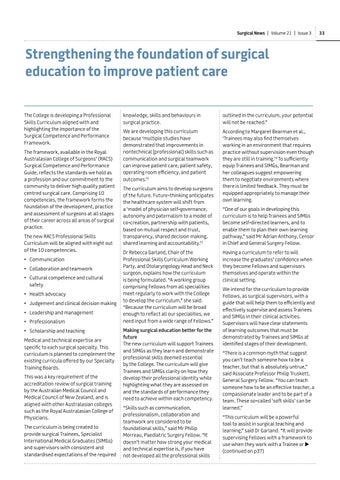Surgical News | Volume 21 | Issue 3
Strengthening the foundation of surgical education to improve patient care The College is developing a Professional Skills Curriculum aligned with and highlighting the importance of the Surgical Competence and Performance Framework. The framework, available in the Royal Australasian College of Surgeons’ (RACS) Surgical Competence and Performance Guide, reflects the standards we hold as a profession and our commitment to the community to deliver high quality patient centred surgical care. Comprising 10 competencies, the framework forms the foundation of the development, practice and assessment of surgeons at all stages of their career across all areas of surgical practice. The new RACS Professional Skills Curriculum will be aligned with eight out of the 10 competencies. • Communication • Collaboration and teamwork • Cultural competence and cultural safety • Health advocacy • Judgement and clinical decision making • Leadership and management • Professionalism • Scholarship and teaching Medical and technical expertise are specific to each surgical specialty. This curriculum is planned to complement the existing curricula offered by our Specialty Training Boards. This was a key requirement of the accreditation review of surgical training by the Australian Medical Council and Medical Council of New Zealand, and is aligned with other Australasian colleges such as the Royal Australasian College of Physicians. The curriculum is being created to provide surgical Trainees, Specialist International Medical Graduates (SIMGs) and supervisors with consistent and standardised expectations of the required
knowledge, skills and behaviours in surgical practice.
outlined in the curriculum, your potential will not be reached.”
We are developing this curriculum because ‘multiple studies have demonstrated that improvements in nontechnical [professional] skills such as communication and surgical teamwork can improve patient care, patient safety, operating room efficiency, and patient outcomes.’1
According to Margaret Bearman et al., ‘Trainees may also find themselves working in an environment that requires practice without supervision even though they are still in training.’3 To sufficiently equip Trainees and SIMGs, Bearman and her colleagues suggest empowering them to negotiate environments where there is limited feedback. They must be equipped appropriately to manage their own learning.
The curriculum aims to develop surgeons of the future. Future-thinking anticipates the healthcare system will shift from a ‘model of physician self-governance, autonomy and paternalism to a model of co-creation, partnership with patients, based on mutual respect and trust, transparency, shared decision making, shared learning and accountability.’2 Dr Rebecca Garland, Chair of the Professional Skills Curriculum Working Party, and Otolaryngology Head and Neck surgeon, explains how the curriculum is being formulated. “A working group comprising Fellows from all specialities meet regularly to work with the College to develop the curriculum,” she said. “Because the curriculum will be broad enough to reflect all our specialities, we need input from a wide range of Fellows.” Making surgical education better for the future The new curriculum will support Trainees and SIMGs as they learn and demonstrate professional skills deemed essential by the College. The curriculum will give Trainees and SIMGs clarity on how they develop their professional identity while highlighting what they are assessed on and the standards of performance they need to achieve within each competency. “Skills such as communication, professionalism, collaboration and teamwork are considered to be foundational skills,” said Mr Philip Morreau, Paediatric Surgery Fellow. “It doesn’t matter how strong your medical and technical expertise is, if you have not developed all the professional skills
“One of our goals in developing this curriculum is to help Trainees and SIMGs become self-directed learners, and to enable them to plan their own learning pathway,” said Mr Adrian Anthony, Censor in Chief and General Surgery Fellow. Having a curriculum to refer to will increase the graduates’ confidence when they become Fellows and supervisors themselves and operate within the clinical setting. We intend for the curriculum to provide Fellows, as surgical supervisors, with a guide that will help them to efficiently and effectively supervise and assess Trainees and SIMGs in their clinical activities. Supervisors will have clear statements of learning outcomes that must be demonstrated by Trainees and SIMGs at identified stages of their development. “There is a common myth that suggest you can’t teach someone how to be a teacher, but that is absolutely untrue,” said Associate Professor Philip Truskett, General Surgery Fellow. “You can teach someone how to be an effective teacher, a compassionate leader and to be part of a team. These so-called ‘soft skills’ can be learned.” “This curriculum will be a powerful tool to assist in surgical teaching and learning,” said Dr Garland. “It will provide supervising Fellows with a framework to use when they work with a Trainee or (continued on p37)
33





























